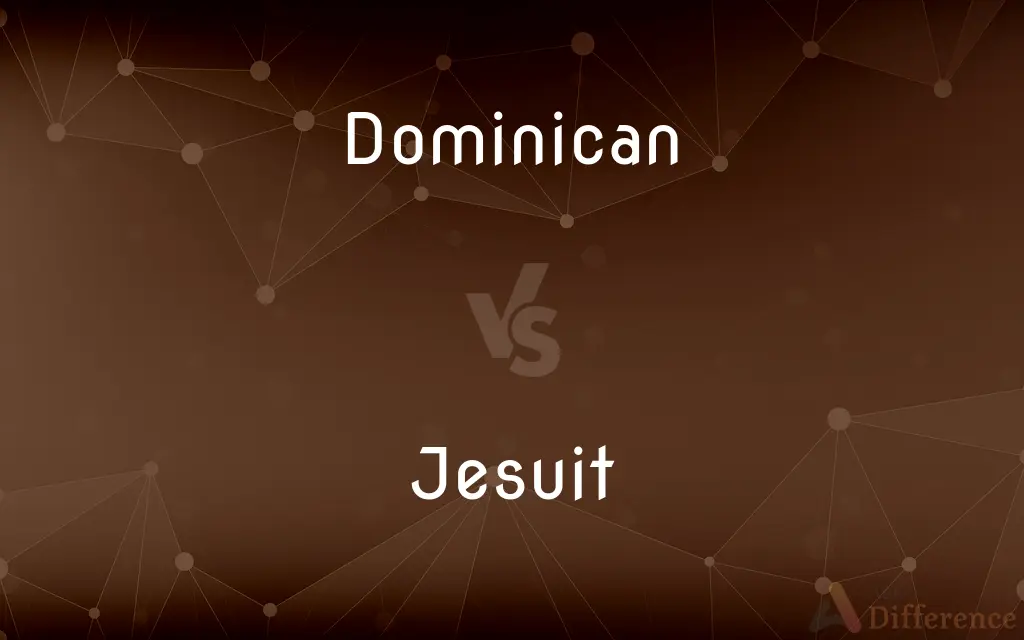Dominican vs. Jesuit — What's the Difference?
By Fiza Rafique & Urooj Arif — Updated on March 28, 2024
Dominicans are a Catholic religious order focused on preaching and teaching, founded by St. Dominic in the 13th century, while Jesuits, founded by St. Ignatius of Loyola in the 16th century, emphasize education, intellectual research, and missionary work.

Difference Between Dominican and Jesuit
Table of Contents
ADVERTISEMENT
Key Differences
The Dominicans, officially known as the Order of Preachers (O.P.), were established with the primary aim of preaching the Gospel and combating heresy. Their foundation by St. Dominic in the early 13th century was motivated by a need to address the Albigensian heresy through the education of the clergy and laypeople. In contrast, the Society of Jesus, or Jesuits (S.J.), founded by St. Ignatius of Loyola in the 16th century, emerged during the Counter-Reformation. The Jesuits are noted for their dedication to education at all levels, from elementary education to universities, as well as for their missionary work and intellectual research.
Dominican spirituality is marked by a strong emphasis on community life, liturgical prayer, and contemplation, with a particular devotion to the Rosary. This spiritual orientation supports their preaching mission by fostering a deep personal relationship with Christ and a thorough understanding of Catholic doctrine. On the other hand, Jesuit spirituality focuses on the Spiritual Exercises of St. Ignatius, which encourage individual discernment of God's will and active engagement with the world through a lens of faith. Jesuits are known for their adaptability and for working in various social contexts to promote justice and education.
The Dominicans have historically contributed to the Catholic Church through their scholarly work, including the contributions of Thomas Aquinas, whose writings remain influential in Catholic theology. Dominicans often serve in academic roles, contributing to theological and philosophical discourse. Jesuits, while also deeply involved in education and scholarship, have played significant roles in missionary work across the globe, engaging in interreligious dialogue and cultural exchange. Notable Jesuits include scientists, philosophers, and missionaries who have impacted various fields and communities worldwide.
Both orders take vows of poverty, chastity, and obedience, but Jesuits also take a special vow of obedience to the Pope regarding mission assignments, reflecting their close alignment with the papal mission. While Dominicans primarily wear white habits, symbolizing purity, Jesuits do not have a distinct habit, often wearing clerical attire appropriate to their setting, which underscores their adaptability and commitment to being "contemplatives in action."
In summary, although both the Dominicans and Jesuits share the common goal of serving the Catholic Church and its teachings, they do so through distinct charisms and missions: Dominicans through preaching and teaching grounded in a contemplative life, and Jesuits through education, intellectual research, and missionary work grounded in discernment and active engagement with the world.
ADVERTISEMENT
Comparison Chart
Founding
Early 13th century by St. Dominic
16th century by St. Ignatius of Loyola
Key Emphasis
Preaching and teaching
Education, intellectual research, missionary work
Spirituality
Community life, liturgical prayer, contemplation
Spiritual Exercises, discernment, "finding God in all things"
Notable Practices
Devotion to the Rosary
Spiritual Exercises, special vow of obedience to the Pope
Contributions
Theological and philosophical scholarship, combating heresy
Global missionary work, education, interreligious dialogue
Vows
Poverty, chastity, obedience
Poverty, chastity, obedience, special obedience to the Pope
Habit
White habit
No distinct habit; often wear clerical attire
Foundational Mission
To preach the Gospel and combat heresy
To serve the Pope and the Church in whatever capacity deemed necessary
Famous Figures
Thomas Aquinas
Matteo Ricci, Pierre Teilhard de Chardin
Compare with Definitions
Dominican
Members of the Order of Preachers, focusing on preaching and combating heresy.
The Dominican friar delivered a compelling sermon on faith and reason.
Jesuit
Members of the Society of Jesus, known for their educational and missionary work.
The Jesuit priest taught at a renowned university and participated in missionary outreach.
Dominican
Founded by St. Dominic to address the Albigensian heresy through education.
Dominicans established universities to educate clergy and laity.
Jesuit
Practice discernment through the Spiritual Exercises.
Jesuit spirituality encourages finding God in all aspects of life.
Dominican
Wear a distinctive white habit symbolizing purity.
The white habit of the Dominicans is a familiar sight in their schools and parishes.
Jesuit
Have a flexible approach to their presence and attire, adapting to various contexts.
Jesuits often wear clerical attire suited to their environment and mission.
Dominican
Emphasize community life and contemplative prayer.
Dominicans gather daily for communal prayers and the chanting of the Psalms.
Jesuit
Founded by St. Ignatius of Loyola with a focus on obedience to the Pope.
Jesuits take a special vow of obedience to the Pope's mission assignments.
Dominican
Notable for their theological scholarship, particularly Thomas Aquinas.
Dominican contributions to Catholic theology are studied worldwide.
Jesuit
Engage in global missionary work and interreligious dialogue.
Jesuit missionaries have been instrumental in fostering dialogue across cultures.
Dominican
A member of a Roman Catholic order of preaching friars established in 1216 by Saint Dominic.
Jesuit
Roman Catholic Church A member of the Society of Jesus.
Dominican
Of or pertaining to St. Dominic (Dominic de Guzman), or to the religious communities named from him.
Jesuit
Often jesuit One given to subtle casuistry.
Dominican
One of an order of mendicant monks founded by Dominic de Guzman, in 1215. A province of the order was established in England in 1221. The first foundation in the United States was made in 1807. The Master of the Sacred Palace at Rome is always a Dominican friar. The Dominicans are called also preaching friars, friars preachers, black friars (from their black cloak), brothers of St. Mary, and in France, Jacobins.
Jesuit
One of a religious order founded by Ignatius Loyola, and approved in 1540, under the title of The Society of Jesus.
Dominican
A Roman Catholic friar wearing the black mantle of the Dominican order
Jesuit
Fig.: A crafty person; an intriguer.
Dominican
Of or relating to Saint Dominic or the Dominican order;
Dominican monks
Jesuit
A member of the Jesuit order
Dominican
Of or relating to the Dominican Republic or its people or culture.
Jesuit
Having qualities characteristic of Jesuits or Jesuitism;
Jesuitical education
Dominican
Of or relating to Dominica or its people or culture.
Dominican
A native or inhabitant of the Dominican Republic.
Dominican
A person of Dominican ancestry.
Dominican
A native or inhabitant of Dominica.
Dominican
A person of Dominican ancestry.
Dominican
Of or relating to or characteristic of the Dominican Republic or its people;
The Dominican population
Common Curiosities
Can women join the Dominicans or Jesuits?
Women can join the Dominican Order as nuns or active sisters involved in various ministries. However, the Jesuit order is exclusively male, though women can participate in Ignatian spirituality and affiliated lay groups.
What is the primary goal of the Dominicans?
The primary goal of the Dominicans is to preach the Gospel and teach the Catholic faith, grounded in a life of community, prayer, and contemplation.
How do Jesuits contribute to the Catholic Church?
Jesuits contribute through education, intellectual research, missionary work, and a special emphasis on obedience and service to the Pope, adapting to the needs of the Church and society.
How do the vows of Dominicans and Jesuits differ?
Both take vows of poverty, chastity, and obedience, but Jesuits also take a special vow of obedience to the Pope, specifically regarding their mission assignments.
How does Dominican spirituality support their mission?
Dominican spirituality, with its focus on community life, liturgical prayer, and contemplation, supports their mission by fostering a deep relationship with Christ and a thorough understanding of Catholic doctrine, enhancing their preaching and teaching.
What distinguishes Jesuit education?
Jesuit education is distinguished by its holistic approach, focusing on intellectual rigor, ethical formation, spiritual growth, and social responsibility, aiming to form "men and women for others."
How do the educational approaches of Dominicans and Jesuits compare?
Both emphasize education, but Dominicans focus more on theology and philosophy to support their preaching mission, while Jesuits adopt a broad, holistic educational approach that includes a wide range of disciplines and focuses on forming individuals to contribute positively to society.
What is unique about Jesuit spirituality?
Jesuit spirituality is unique for its emphasis on the Spiritual Exercises of St. Ignatius, which promote discernment and finding God in all things, encouraging active engagement with the world through a faith perspective.
What roles do Dominicans and Jesuits play in the Church today?
Dominicans and Jesuits both play vital roles in the Church through their respective focuses on preaching, teaching, education, missionary work, and intellectual research, each contributing to the Church's mission in unique and complementary ways.
Are Dominicans or Jesuits involved in missionary work?
Both orders are involved in missionary work, but Jesuits are particularly noted for their extensive global missionary efforts and engagement in interreligious dialogue.
Share Your Discovery

Previous Comparison
Recite vs. Chant
Next Comparison
Magnetodielectric vs. DielectricAuthor Spotlight
Written by
Fiza RafiqueFiza Rafique is a skilled content writer at AskDifference.com, where she meticulously refines and enhances written pieces. Drawing from her vast editorial expertise, Fiza ensures clarity, accuracy, and precision in every article. Passionate about language, she continually seeks to elevate the quality of content for readers worldwide.
Co-written by
Urooj ArifUrooj is a skilled content writer at Ask Difference, known for her exceptional ability to simplify complex topics into engaging and informative content. With a passion for research and a flair for clear, concise writing, she consistently delivers articles that resonate with our diverse audience.












































